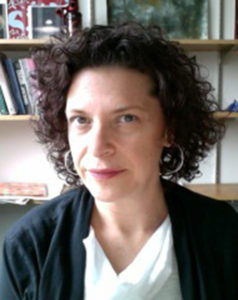Laurie Nardone
Associate Teaching Professor in English
Director, Advanced Writing in the Disciplines
PhD, English Language and Literature/Letters, Emory University
Tell us about your hybrid interdisciplinary Advanced Writing in the Disciplines course.
Advanced Writing in the Disciplines is a requirement for all Northeastern undergraduates. These courses generally focus on student writing and my interdisciplinary course specifically draws on a variety of disciplines to explore a “wicked problem” –an intractable super hard issue to solve.
The course has been offered in person and online but for Fall 2017, I developed a hybrid version of this course with CATLR. I was trying to figure out how I could make this writing course problem-based, and therefore, solution-based. I remember working with Laurie [Poklop], and her saying ‘do you have an example?’ And I said ‘well, like the Flint water crisis. You need all of these disciplines to really think about solving it.’
What does making a course hybrid mean to you?
When I was offering this as a hybrid course, we had certain days that were very content heavy. But when students need to be off doing research or working together as a group, they don’t need to be in the classroom.
The courses have been mostly on campus or online. I was interested in the hybrid course design because, for some students, entirely online is the wrong match but it could be a good transition to learning how to do online classes while still getting that in-person touch stone.
When you were first creating this course, were there any challenges? Or any pleasant surprises?
I had no idea how I would communicate the material, especially online. The first year in the Summer of 2016, was really about how curating my materials. One of the best things I learned to do that semester was keep a shareable folder of ‘wicked problems’ in the news and a ‘transdisciplinary work’ in the news. So every other week I might send an email … so my students could see what was happening around Boston, even on campus. It brought the issue to life, but that was a really hard part.
In fact, Laurie [Poklop] was great at helping me articulate the Flint water crisis for my students, because it needed a visual representation. I needed lots of other ways I could communicate. So I could do video and screencast, but Laurie helped me visually design a PowerPoint, and I was able to do a screencast with it.
Did you see a need in the education landscape for a online course?
Yes, especially at Northeastern where students are on Co-op, at work study, studying for MCAT’s. For the right student, who’s super organized and really great at time management, there’s nothing better. Because it takes the same amount of time, but that time is yours, and you can do the work when it best suits you.
Is there anything you’ve enjoyed about creating an online or hybrid class that’s different from an in person class?
I miss immediately getting that feedback when you’re face-to-face. What I loved learning–and it took a long time to do–was to simulate that online.
We do introductions in our portfolios and the students have to include pictures, for example. Finding ways to simulate that personal connection has opened up a whole new set of tools for me that I now bring back to my face-to-face classes. Writing professional emails is really important for feedback, so while I’d done it initially online to make sure everyone is on the same page, I’m now doing it in my face-to-face classes, too.
Is there anything else besides those emails that help you handle feedback?
I make sure students know how we do office hours online. I do a discussion board that can go to the whole class, so if you have a quick question you can get that answered. I make sure the emails I send are at the same time, every week. As you would do in a face-to-face class, I’m going to tell them what we’re doing for the day, the homework, and I’m even going to include some keywords.
How else has CATLR supported you in developing these courses?
I’m doing work now with Gail [Matthews-DeNatale] and Michael [Sweet]. I’m doing the Faculty Scholars, and Michael is our small group leader. I’ve been working with CATLR for four years in various programs, and it has totally changed my teaching. I know that sounds like a crazy pitch or an advertisement, but it really has!
I think we are, as academics, trained in our discipline and so using CATLR to step outside allows me to look at my teaching. Not my content, but actually saying, what am I doing in the classroom? What am I doing in the online space? The other thing I love about CATLR is that it’s based on curiosity. So it’s never ‘I have to fix my teaching, or I have a new class.’ It’s always ‘I wonder why this is happening?’
Is there any advice you have for people wanting to start online courses?
You don’t need tons of tools. Everybody thinks they have to learn all these sophisticated tools, and you don’t. You have all the tools you need.
